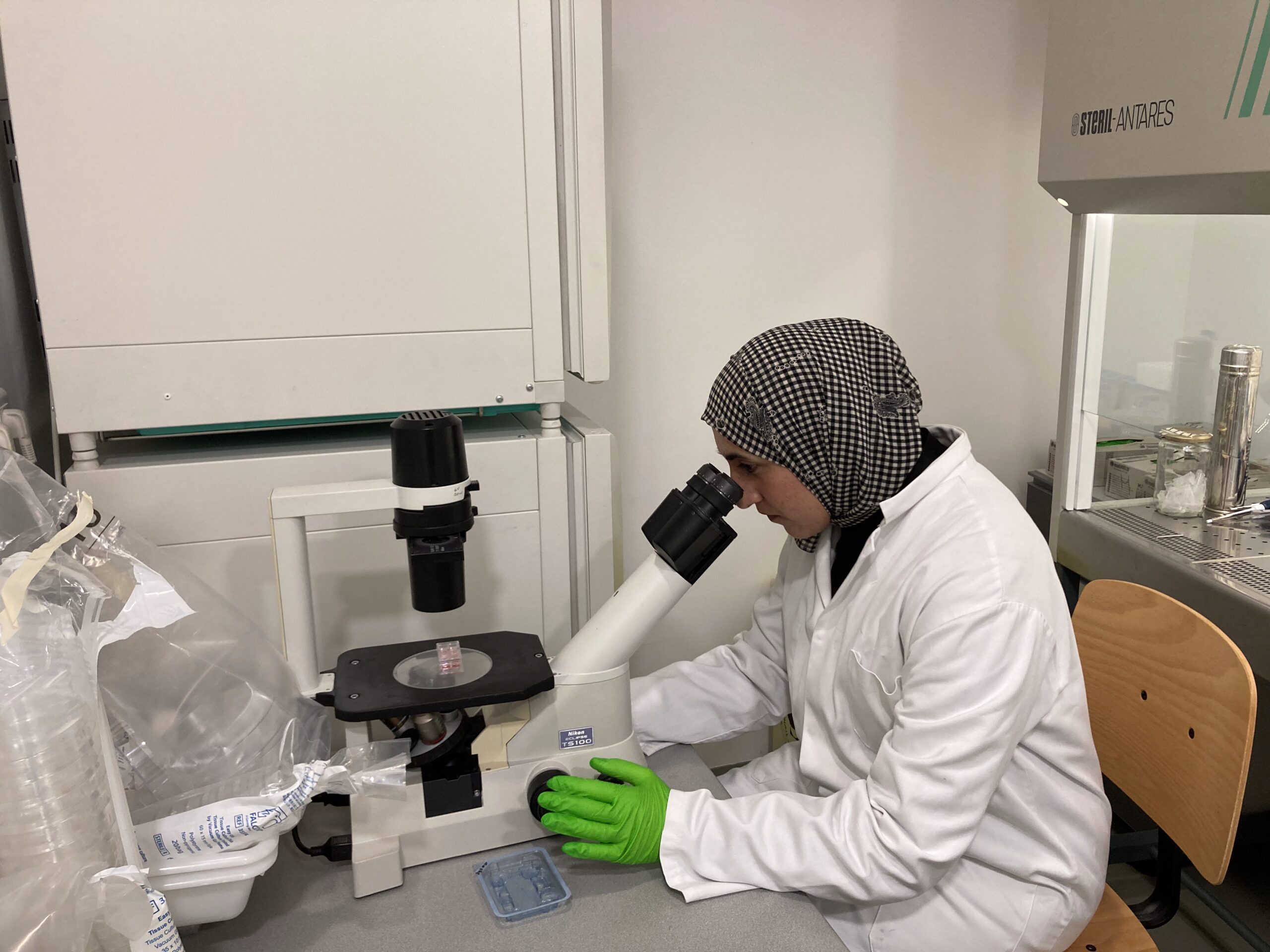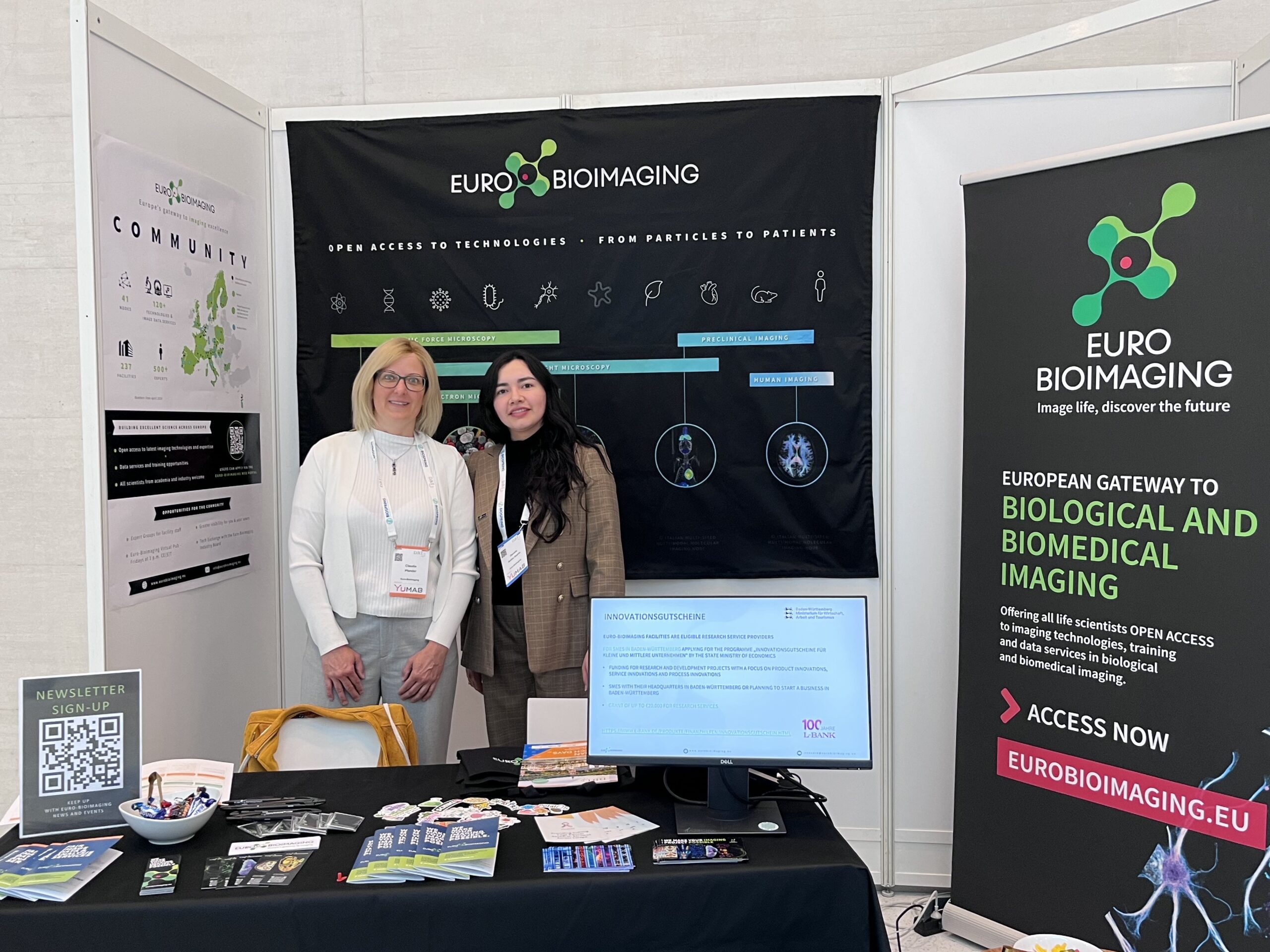
Insights from a job shadowing host: Julien Colombelli and seeding long-term collaborations to inspire new projects
The EVOLVE Job Shadowing programme is a fantastic opportunity for Node staff to immerse in the daily life and operations of other Nodes of the Euro-BioImaging community. Between September 2024 and March 2025, during the programme's first phase, twelve participants will share, learn, explore and discuss topics ranging from innovative imaging processes to facility management best practices. As participants returned to their home institutions, we asked them to reflect on their experiences and share their insights. Discover how this unique program reignited inspiration, sparked new ideas and brought colleagues closer together.
Today, we speak with Julien Colombelli, Core Facility Manager at the Mesoscopic Imaging Node Barcelona, about hosting Sebastian Munck, a senior member of Flanders BioImaging.

Euro-BioImaging: Hello Julien, happy to have that conversation with you! Could you tell us a little about yourself?
Julien Colombelli: I'm an optical engineer by training. After leaving the telecommunications sector many years ago, I transitioned into microscopy. I worked at the European Molecular Biology Laboratory for several years before moving to Barcelona in 2008 to set up the Advanced Digital Microscopy Core Facility at the Institute for Research in Biomedicine Barcelona, where I am the facility manager. We have two kinds of activities. We purchase imaging systems that we put in service for our users. This is the commercial part of assets that our activity relies on. And we also build customised microscopes from scratch and tailor them to specific needs. We curate and integrate components such as lasers and lenses. Our DIY microscopes are fully open and tunable, offering cutting-edge technology for advanced research. With this dual approach—which is rather singular, or seldom, in Europe—we are maximising the capabilities of our facility. This combination allows us to push boundaries and enable applications beyond what commercial systems typically offer. We can keep up with technology as it advances. For instance, we have worked on a system for over 12 years, constantly upgrading it to incorporate new advances and tweaking components to suit our users' needs—often at little cost. With this strategy, we can offer researchers cutting-edge features without having to buy entirely new systems.
Euro-BioImaging: Indeed, your facility's approach is very singular! What motivates you to build custom systems?
Julien Colombelli: I like building imaging applications that will match a particularly demanding request from a user. I love the challenge of adapting to different contexts and different types of samples. I've worked on many exciting projects, including laser nanosurgery—a niche but fascinating technique where collaborators' needs pushed me to develop numerous applications. More recently, I have been focusing on light sheet microscopes. With this type of microscope, we've simplified how cleared samples are mounted, making it significantly easier for users to run their experiments and use larger samples. I'm proud of that achievement. It's very gratifying to improve not only the technology but also the user experience.
Euro-BioImaging: What motivated you to host a participant in the Euro-BioImaging job shadowing program?
Julien Colombelli: I've known Sebastian Munck through past collaborations. I knew that hosting him would be an opportunity to deepen our shared interest in light sheet microscopy, explore new ideas together, and exchange and discuss Science. Through the programme, I know we could have time to brainstorm. I know I could have time to really listen to Sebastien's needs, understand them and find ways to solve them. The idea behind our exchange was that Sebastian would find inspiration from our facility for solutions he could develop back to his home institution. Our time together was very hands-on, very practical, and at the same time, we also managed to touch upon much deeper topics and have really inspiring discussions. Being able to sit down with Sebastian to talk about Science was really rewarding. Usually, these conversations are rushed at conferences—10 minutes here, 5 minutes there. This visit allowed us to really take the time to explore ideas in depth, which was incredibly valuable. That's one of the biggest benefits of the Job Shadowing programme.
Euro-BioImaging: Did you prepare specifically for his visit?
Julien Colombelli: Yes, we did prepare! To make the most of Sebastian's short visit, I built a standalone optical bench as a proxy for one of our systems. It was a real-life light sheet microscope sandbox. I built it as a possible version of the system that Sebastian could use at his facility in the future. This setup allowed us to test light shaping techniques and explore various configurations directly on a bench. We also experimented extensively with 3D printing—which was probably the visit's true highlight. We printed custom components to test a specific optical solution. Surprisingly, a 3D-printed mount, which cost just a few euros, performed comparably to a commercially available solution worth thousands. It was a rewarding discovery, and it struck a note in Sebastian, inspiring him to consider using 3D printing in his work.
Euro-BioImaging: What stood out to you during Sebastian’s visit?
Julien Colombelli: Well, the 3D printing experiment was particularly memorable. One thing we did was to test one specific solution of 3D-printed optomechanics to be compatible with one specific optical component. Such a combination was not something that I had seen before. Numerous theoretical optical limitations suggested that this combination would be unfeasible. But we decided to try it to test if it would be possible. A 3D-printed holder costs 3 or 4 euros, so why not experiment? And it worked! With Sebastian, we were delighted by the outcome. This success demonstrated how DIY approaches can empower scientists to innovate quickly and affordably. That moment was the tipping point when Sebastian got convinced that he had to get into 3D printing at his home institution. That technique empowers scientists with DIY tools that make your life easier when you develop instruments. If you understand them, limitations are not really limiting you. They define how to get the job done.
Euro-BioImaging: Did the exchange have a positive impact on your team?
Julien Colombelli: Definitely. It was valuable to have an intensive, focused visit where we could step away from regular duties. As a team, we unplugged our daily routines to focus on something different. We all gathered in a room and worked on something collaboratively, which rarely happens. I even organised a small workshop with Sebastian and the team on the Dos and Don'ts of 3D printing. It was fantastic to block time to do such activities. Usually, our facility is busy with users, so finding the time to sit down and work on practical tasks together in a dedicated way was a great opportunity. The team was delighted to have benefitted from that time bubble created by Sebastian's visit.
Euro-BioImaging: What impact do you think the job shadowing program has on the Euro-BioImaging community?
Julien Colombelli: It creates a unique space for collaboration. Unlike conferences, which are often too rushed, this programme allows participants to deeply engage with ideas and technology. The Job Shadowing programme can potentially create a massive ripple effect and drastically increase the community's capacity. Participants acquire experience and knowledge, return to their home institute, and disseminate what they have learned. That's already huge. But there is more to that! Exchanges in the Job Shadowing programme can seed long-term collaborations and inspire new projects. For example, Sebastian and I have already discussed continuing our work by exchanging samples and testing technologies, which could lead to further Euro-BioImaging access projects. This would never have happened without the Job Shadowing programme.
Euro-BioImaging: Are you going to collaborate further with Sebastian?
Julien Colombelli: I'm confident about it. We now have a list of things to test. Our discussions have been very productive, mainly because our institutes are similar—though not in size, as the Vlaams Instituut voor Biotechnologie (VIB), where Sebastian works, is much larger. Both focus on biomedicine, biomedical applications, and fundamental research that drives discoveries in biomedicine. However, VIB places a strong emphasis on brain research, including brain development and Alzheimer's disease, which we approach a bit differently here. I can already see that we aim to exchange samples and test our new technology on their material soon. This will almost certainly lead to technology access and/or collaborations. Of course, there's always some uncertainty—it's like tossing a coin—but we've shared ideas and will likely run experiments soon. That could mean another year of imaging access as we test these ideas with our new technology. We're building a long-term relationship, and it will be very valuable.
Euro-BioImaging: Would you host another participant?
Julien Colombelli: Absolutely, provided there's mutual interest. Hosting is time-consuming, especially for a busy facility like ours, but it's incredibly gratifying. The exchange must be a two-way street where both parties gain knowledge and inspiration.
Euro-BioImaging: Any suggestions for improving the job shadowing experience?
Julien Colombelli: Compared to what we have done, one improvement could be always to try extending the duration of visits. A longer, more flexible schedule might make it easier for hosts to balance their daily responsibilities with hosting duties. In our case, half days over a period of two weeks would have worked very well. This approach could also allow for more meaningful interactions with the entire facility team. But I get that this complicates things for the visiting party, who has to stay at the location much longer.
Euro-BioImaging: What advice would you give to other nodes considering hosting?
Julien Colombelli: Go for it. Hosting is so enriching that it goes beyond merely transferring knowledge—it generates collaboration, sparks new ideas, refreshes your approaches to issues, and gives you new perspectives. A programme like Job Shadowing is a unique opportunity to step out of your daily grind and engage in meaningful scientific exchanges. So go for it, without a doubt.
More news from Euro-BioImaging


